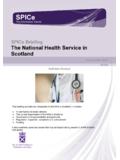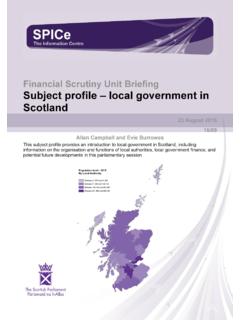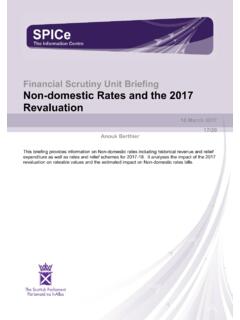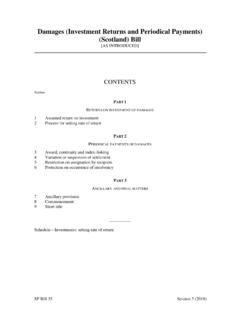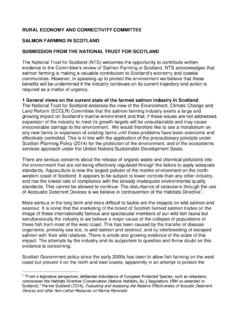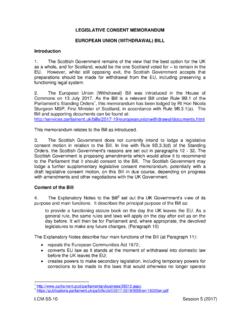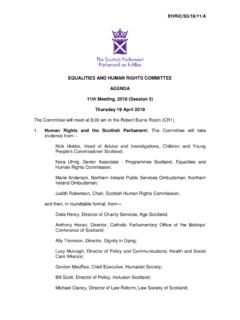Transcription of Inheritance law in Scotland - Scottish Parliament
1 The Sc ot tish Parliament and Scottis h Parliament I nf or mation C entre l ogos . SPICe Briefing Inheritance law in Scotland 25 August 2015 15/45 Sarah Harvie-Clark This briefing provides an introduction to Inheritance law in Scotland , also known as succession law or the law of succession. This area of law says what happens to someone s property and possessions when he or she dies. The briefing is divided into two parts: The first part of the briefing covers the current law and practice. It includes the law where somebody dies without making a will, as well as the law where a will is made. The second part of the briefing outlines the key recommendations for reform contained in a report of the Scottish Law Commission. In June 2015 the Scottish Government published its consultation on these recommendations.
2 Please note that SPICe can only provide general information relating to the law of Scotland . If, for example, a constituent wishes to receive legal advice in relation to the circumstances of his or her individual case he or she should contact a solicitor. 2 CONTENTS EXECUTIVE SUMMARY .. 3 INTRODUCTION AND OVERVIEW .. 7 PRACTICAL MATTERS .. 7 Funeral arrangements and registering a death .. 7 Making a will .. 7 A RANGE OF REFORMS .. 8 The SLC s work on succession .. 8 Two Scottish Government projects on succession .. 8 Succession and the land reform agenda .. 8 THE CURRENT LAW AND PRACTICE .. 9 AN OVERVIEW WITH SOME KEY TERMINOLOGY .. 9 The basics .. 9 Legacies and vesting .. 9 The role of the executor and of confirmation .. 9 Trusts and trustees .. 10 Intestacy.
3 10 Disinheritance and the role of legal rights .. 10 PEOPLE S WILL-MAKING PRACTICES IN Scotland .. 11 THE ROLE OF SURVIVORSHIP DESTINATIONS .. 11 THE DISTINCTION BETWEEN HERITABLE AND MOVEABLE PROPERTY .. 12 WHERE SOMEBODY DIES WITHOUT LEAVING A WILL .. 12 The Succession ( Scotland ) Act 1964 and the Family Law ( Scotland ) Act 12 The stages of distributing an intestate person s estate .. 12 Prior rights .. 12 The legal rights of the surviving spouse or civil partner .. 13 The legal rights of the children .. 13 The free estate .. 14 The cohabitant s claim .. 15 WHERE SOMEBODY DIES AND LEAVES A WILL .. 16 Requirements for a valid will .. 16 Common aspects of wills .. 17 Cancelling or changing a will .. 17 Protection from disinheritance .. 18 THE 2009 REPORT OF THE Scottish LAW COMMISSION.
4 18 THE ABOLITION OF THE DISTINCTION BETWEEN HERITABLE AND MOVEABLE PROPERTY .. 19 WHERE SOMEBODY DIES WITHOUT LEAVING A WILL .. 19 Overview .. 19 The deceased leaves a spouse or civil partner but no children .. 19 The deceased leaves a spouse or civil partner and children .. 19 The deceased leaves children but no spouse or civil partner .. 20 The deceased leaves neither children nor a spouse or civil partner .. 20 WHERE SOMEBODY DIES AND LEAVES A WILL: PROTECTION FROM DISINHERITANCE .. 21 Protection for the spouse or civil partner .. 21 Protection for children .. 21 Impact on agricultural units .. 22 Protection for a cohabitant .. 23 SOURCES .. 25 RELATED BRIEFINGS .. 28 3 EXECUTIVE SUMMARY Key terminology In Inheritance law the deceased person s property and possessions are called the estate.
5 The people or organisations that will benefit from the estate when it is distributed are called the beneficiaries. Where a person makes a will he or she is sometimes referred to as the testator. The person who manages the process of gathering in the estate, paying any debts and taxes due and distributing the remainder of the estate to the beneficiaries is called the executor. Will-making practices in Scotland The most recent research on the topic (by the former Scottish Consumer Council) would suggest that most people living in Scotland do not have a will. However, making a will is much more common amongst the over 65s and those people from higher socio-economic groups. Useful information on making a will can be found on the webpage of Citizens Advice Scotland entitled Wills.
6 If a person is considering making a will it is advisable to consult a solicitor. The distinction between heritable and moveable property The current law of succession makes a distinction between heritable property and moveable property for various purposes. Heritable property (sometimes also called immoveable property) is land and buildings. Moveable property is everything else. The family home is typically the deceased s main asset and it falls into the category of heritable property. A family farm would also fall into this category. Movable property includes, for example, furniture, a car, money, and shares in a company. Where somebody dies without leaving a will If a person dies without leaving a valid will, then, on his or her death, that person is described as intestate (as is the estate).
7 Where there is no will, distributing the deceased person s estate involves a series of steps which must be carried out in a set order. First of all, the executor has to pay debts and meet certain liabilities from the dead person s estate. Then certain beneficiaries can exercise rights called prior rights and legal rights. The prior rights of the spouse or civil partner must be satisfied first, then the legal rights of any spouse or civil partner. 4 The next priority is the legal rights of any children of the deceased. Adult children can claim legal rights, as well as children under 16. Finally, the remaining estate (the free estate), must be distributed according to a statutory list of potential beneficiaries contained in the Succession ( Scotland ) Act 1964. Children (including adult children) are top of the list of potential beneficiaries.
8 A cohabitant can also apply to the court for an award from the deceased s estate. If successful, the cohabitant s claim comes from the part of the estate which is left after the prior rights and the legal rights of the spouse or civil partner have been satisfied. Requirements for a valid will There are various requirements which must be met in order for a will to be valid. These include that the will is in writing and that it has been signed at the bottom of the last page by the person making the will. It must also have been made by a person of sound mind. Furthermore, it must have been made voluntarily and without pressure from another person. It is standard practice for a solicitor to advise his or her client to make a probative or self-proving will. This is a will that is presumed to be validly executed.
9 A probative will must satisfy certain additional requirements. Cancelling or changing a will A person may wish to cancel (revoke) an existing will. The normal method of doing this is to physically destroy it. A will prepared by a solicitor will almost invariably have a clause in it saying that any previous will is revoked. This cancels an earlier will, even if it is not destroyed. However, where a will which revokes a previous will is itself revoked, the original will may take effect again (revive). Where somebody dies and leaves a will: protection from disinheritance When a will aims to exclude a particular person from inheriting any of the deceased s estate, the will aims to disinherit that person. In Scotland it is not possible for a person to disinherit his or her spouse, civil partner or children entirely.
10 This protection is provided by the concept of legal rights which give the people concerned a share of the deceased s moveable property. Hence, the family home is excluded from the scope of legal rights. Where there is a will, cohabitants are not protected from disinheritance. Recommendations for reform an overview The Scottish Law Commission (SLC) is the body which makes recommendations for law reform to Scottish Ministers. In 2009 it published a report recommending significant reforms to succession law. Some specific aspects of the report were consulted on by the Scottish Government in 2014. Most of the recommendations consulted on now feature in the Succession ( Scotland ) Bill introduced in the Scottish Parliament in June 2015. 5 On the other hand, the more wide-ranging recommendations for reform are being consulted on separately, in a consultation published in June by the Scottish Government (2015c).
